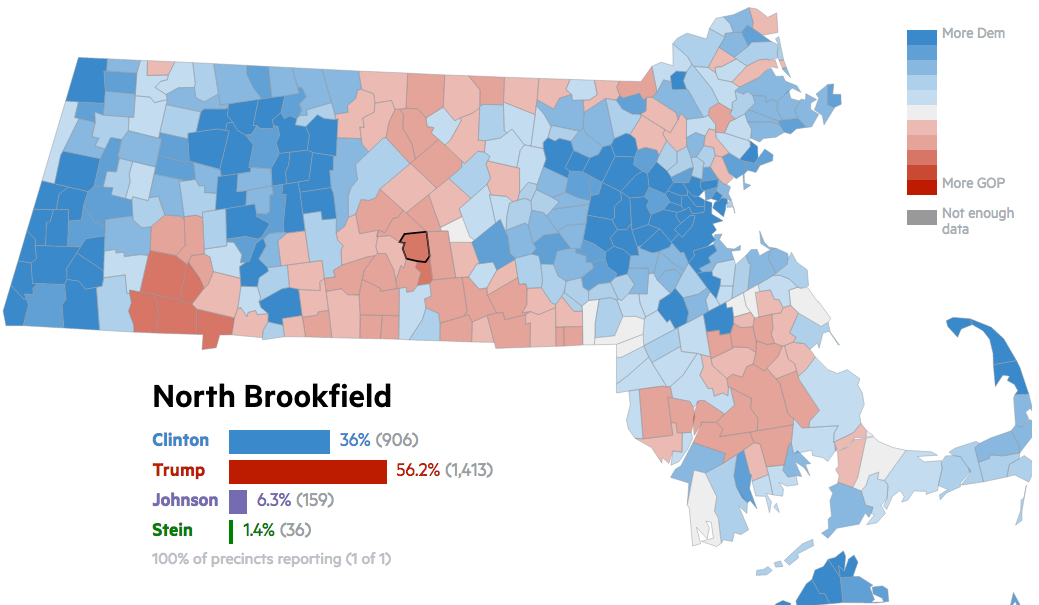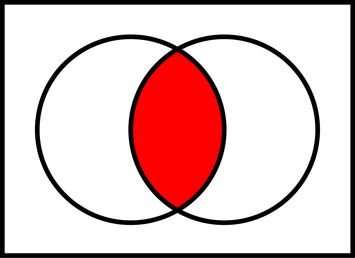|
Recently, on createquity.com, Ian David Moss wrote the following: The 2016 election laid bare not only a seething undercurrent of bigotry and xenophobia in our midst, but also just how politically and culturally segregated America has become. Are the arts part of the solution? Have they been part of the problem? We ought to find out. Yes, let's please find out. I've been thinking about this idea of cultural segregation in recent weeks. Consider my home state of Massachusetts. The 2016 election results map below tells essentially the same tale as a map of the entire nation: there is a broad band of red made up of towns in the middle of the state that I can't name and have never visited. The closest I ever get to them is when I'm whizzing by on the Mass Pike on the way to Amherst or the Berkshires. I've never met anyone from North Brookfield. Remember the rural residencies for chamber music ensembles funded by the National Endowment for the Arts? In 1992, the Ying Quartet was a poster child for this initiative, graduating from the Eastman School of Music and getting their professional career started in Jesup, Iowa. (Interestingly, Jesup is located right on the border of Buchanan and Black Hawk counties. Earlier this month, Buchanan voted for Trump while Black Hawk was one of only several counties in the entire state that went Clinton's way.) In the aftermath of the 2016 election, as we begin to learn about how divided our country has become, I wish for a way for our nation's open wound to be stitched up. Could the careful sewing of exposed flesh be accomplished with help from musicians? After all, while attempts at conversation are full of stubborn subconscious meaning-making, isn't music considered to be a universal language, transcending cultural barriers through wordless communication? Attention funders: I'm advocating for cultural diplomacy right here in Massachusetts. A granting program that encourages cultural exchanges, led by artists (with support from trained facilitators), between the state's urban and rural communities. Let's look to the arts to help us sew up the tear in our cultural fabric. Given an appropriate frame, a visceral experience with live music may be able to create the empathic space for the deep stories of our neighbors to safely emerge and be shared. Of course, when deep stories are brought to the surface, we have to be ready to respond with empathy and understanding. I believe that music may be an effective vehicle to help us get below the surface-level discourse, but who is going to help us with the challenge of continuing the conversation once it has begun? Personally, I would place my trust in the Interaction Institute for Social Change. Another challenge: a cultural exchange is a two-way street. Are we ready to be receptive to what may be shared with us? Just as receptive as we wish others to be when we share our culture with them? Our challenge awaits. How will artists contribute to affirming a shared belief in connection and inclusivity? In the words of New York Times columnist David Brooks: "The job for the rest of us is to rebind the fabric of society, community by community, and to construct a political movement for the post-Trump era."
3 Comments
My needs as an artist...... .......My community's needs NEC's Center for Professional Development and Performing Arts Leadership
presents a Workshop Series at Community MusicWorks (November 2016—May 2017) Goal: A space for CMW Fellows to reflect on their evolving personal practice at the intersection of being a musician and being relevant in the life of a community. We are also looking at this intersection through the lens of an organizational practice (e.g. Community MusicWorks). Workshop Schedule (dates and topics subject to change.) Nov 18 11:00 Fellows Quartet performance project (planning session #2) 12:00 review time budgets, aligning interests, LinkedIn Dec 16 11:00 Culture of philanthropy, asking for money (guest: CMW’s Development Director Katie Sklar) 12:00 Fellows Quartet performance project (planning session #3) Jan 27 11:00 Asking for money follow up 12:00 governance (roles, early stages, how to be effective) Feb 17 11:00 Grant writing and reporting, evaluation March 17 11:00 Grants follow up 12:00 roundtable with alumni of last year’s Building a Community-Based Residency class April 7 11:00 Personal and organizational budgeting, financial reporting as narrative (guest: CMW’s Managing Director Kelly Reed) May 12 11:00 Audience engagement laboratory, Fellows Quartet performance project reflection/review If you are interested in sitting in, RSVP: [email protected] |
AboutSharing student project documentation and, more recently, my own. Archives
June 2022
Categories |


 RSS Feed
RSS Feed
